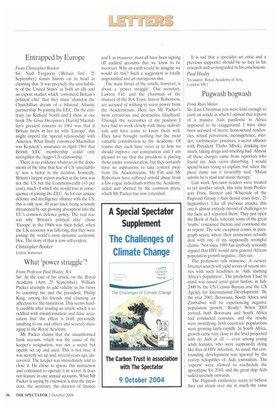Entrapped by Europe
From Christopher Booker Sir: Niall Ferguson (Britain first'. 25 September) stands history on its head in claiming that 'it was precisely the unreliability of the United States' as both an ally and an export market which 'convinced Britain's political elite' that they must 'abandon the Churchillian dream of a bilateral Atlantic partnership' by joining the EEC. On the contrary (as Richard North and I show in our book The Great Deception), Harold Macmillan's greatest concern in 1961 was that if Britain threw in her lot with 'Europe', this might imperil the 'special relationship' with America. What finally convinced Macmillan was Kennedy's assurance in April 1961 that British EEC membership could only strengthen the Anglo-US relationship.
There is no evidence whatever in the documents of the time that fear of US 'unreliability' was a factor in the decision. Ironically, Britain's largest export market at the time was not the US but the Commonwealth (43 per cent), much of which she would lose in consequence of joining the EEC. As for our unique defence and intelligence alliance with the US, this is only now, 40 years later, being seriously threatened by our growing absorption into the EU's common defence policy. The real reason why 'Britain's political elite' chose 'Europe' in the 1960s was their belief, when the UK economy was faltering, that they were joining the world's most dynamic economic bloc. The irony of that is now self-evident.
Christopher Booker
Litton, Somerset


















































































 Previous page
Previous page